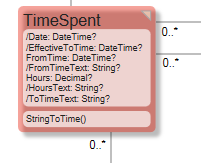What Are These?
- Derived attributes use an OCL expression to calculate the presentation of another attribute.
- Derived settable attributes use EAL to do the reverse, i.e. setting the source attribute from the entered value. The user input is in the vInputParameter variable.
This opens up special handling of user input and "user shortcuts" in the UI - for example, accepting only a number as a time entry.
Example with Time (DateTime) and Decimal
This example uses FromTimeText, HoursText, and ToTimeText for user input, but only FromTime and Hours for storing information in the database.
This special handling makes user input much simpler because it handles the user's need to change any of the three values, updating the others behind the scenes.
- /Date is a derived attribute for easy access to a neighboring class containing the date in DateTime format.
- /EffectiveToTime is a derived attribute used as a companion to the FromTime, again for symmetry in accessing the information.
Support function StringToTime()
To help the other function with conversion, a help function like this was created:
if aText.length <= 2 then
DateTime.Parse('1900-01-01 ' + aText + ':00')
else
DateTime.Parse('1900-01-01 ' + aText)
endif
- Note the addition of ":00" to the text if it is short. This helps the user out of entering just the hour part.
- '1900-01-01' is an ugly hack to prevent storing the current date as part of the time entry. It would still work, but this is slightly better.
Property Inspector
Below is the property inspector setting for a derived settable attribute. Note the AttributeMode and then the OCL and OclSet code.
/FromTimeText: String?
OCL
if self.FromTime.notNull then
self.FromTime.formatDateTime('HH:mm')
else
String.nullValue
endif
EAL (OclSet)
self.FromTime := self.StringToTime(vInputParameter)
/HoursText: String?
OCL
In Sweden, we use the comma instead of the dot as a decimal separator. Hard-coded replacement:
self.Hours.ToString('N2').Replace('.', ',')
EAL (OclSet)
Enable the use of both the comma and dot as decimal separators. Round to 2 decimals.
self.Hours := Decimal.Parse(vInputParameter.Replace(',', '.')).Round(2)
/ToTimeText: String?
The to-time is all calculated and only exists when showing and entering values.
OCL
if self.FromTime.notNull then
self.FromTime.AddHours(self.Hours.Value.ToDouble).formatDateTime('HH:mm')
else
String.nullValue
endif
EAL (OclSet)
Handle both setting Hours or FromTime based on what information is already present.
if self.FromTime.notNull then self.Hours := Decimal.Create(self.StringToTime(vInputParameter).Subtract(self.FromTime).TotalHours) else self.FromTime := self.StringToTime(vInputParameter).AddHours(-self.Hours.ToDouble); 0 endif
See also:


